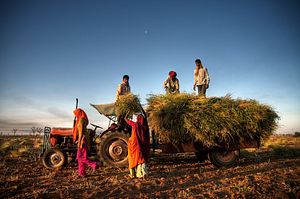Beginning in late-March, several states in India usualy face heat waves that work their way up to minor droughts in the extremely humid summer months of April, May, and June. This year, the situation has been much worse than usual. The desert state of Rajasthan in northwest India set a record temperature on May 19, when the city of Phalodi hit 51 degrees Celsius. In April, 19 out of the 33 districts in Rajasthan were reported to be facing severe drought.
As the second week of May set in, 135,000 villages in Rajasthan were entirely parched. In the neighboring state of Gujarat, temperatures soared so high that the city of Valsad saw a road melt from the heat. Nearby, in the state of Maharashtra, the city of Latur is facing a drought of such severe proportions that the “Jaldoot Express,” a specially commissioned train, has been deputed twice to carry water to the city residents.
Last week, the Indian Meteorological Department (Met) issued a “severe heat wave” warning (implying a temperature of 47 degrees Celsius or more) for the national capital, Delhi, as well as for the states of north and central India. Rajasthan continues to be the worst affected, with more cities edging up to the 50 degree Celsius mark than anywhere else.
The NGO Swaraj Abhiyan filed a Public Interest Litigation (PIL) with the Supreme Court (SC) of India alleging that in parts of 12 states, the authorities were implementing inadequate measures to tackle a drought of this intensity. On hearing the PIL the Court, on May 11, came down severely on both the central government and the states.
Some states like Gujarat, Bihar and Haryana, were specifically called out for their unwillingness to acknowledge the severity of the problem, while the central government was asked to “show some seriousness” instead of trying to absolve itself of responsibilities by relegating the problem to state-level authorities. The late declaration of drought by some states was severely criticized by the SC, which accused them of “denying the poor the right to live with dignity of life.” The central government was given instructions to update a 60-year-old manual on Drought Management, frame a National Plan to assess risk and, also, within three months, set up a Disaster Mitigation Fund.
Indian Prime Minister Narendra Modi has never really shied away from the discussion on rising temperatures and has even authored a book on climate change in the past—so a rap on the knuckles regarding his government’s apathy to environmental disaster seems to have caused some unease. Earlier in April, he had publicly declared his government’s commitment to irrigate parched farmlands and arrive at a permanent solution to drought.
In the wake of the Court’s directions, New Delhi was jolted into action, with Modi arranging meetings with officials from the states of Chhatisgarh, Jharkhand, Maharashtra, Andhra Pradesh, Telengana, Karnataka, Rajasthan, Gujarat, Odisha, Uttar Pradesh, and Madhya Pradesh to discuss each of their specific policies regarding the drought and management of the water crisis in agriculture. In the May 2016 edition of his monthly nationwide address over the All India Radio, “Mann ki Baat,” he declared that he was blown away by some states’ efforts and had asked the government’s development think-tank, the Niti Aayog, to look into best practices and how adaptable and feasible they could be in other states.
Modi also urged individuals to actively take responsibility for water conservation, water harvesting, and water sharing. Talking of people’s intimate link with nature, he declared that the lack of attention toward the earth and the environment has caused neglect-induced disasters like the forest fires in some Himalayan states. Romanticizing water as an elixir that was a direct gift from God, he urged citizens to no longer be apathetic to their surroundings and instead save water “drop by drop” over the next few months, concluding with a reminder that such a severe lack of water supply was not just a problem for India’s farmers.
The real challenge however lies in the months ahead, with strict directives from the Court to fulfill and the looming possibility of a delayed monsoon. Long-term solutions are only possible if the commitment professed over radio and in speeches translates into more robust drought and disaster management infrastructure.

































